While colder weather often causes us to crave warm foods (and carbs!), eating produce during the winter months does not have to be boring. Incorporating seasonal options and focusing on increasing your intake of root vegetables during the cold winter months will ensure that your plate or bowl is always full of good-for-you vitamins and nutrients.
Seasonal Produce
Produce harvest in Maryland does slow during the colder winter months of December, January and February but that doesn’t mean that you have to give up your vegetables. Focus instead of those items that are harvested later in the season. Vegetables like broccoli, Brussel sprouts, cabbage, cauliflower, chard, collards, kale, mushrooms, onions, radishes, spinach, winter squash, sweet potatoes, and turnips are all good options for making soups, stews and other dishes during the winter season.
Try:
- Roasted or Grilled Cauliflower Steak
- Braised Greens with freshly ground black pepper and citrus juice/zest
- Sautéed cabbage with onions, carrots, and fresh herbs
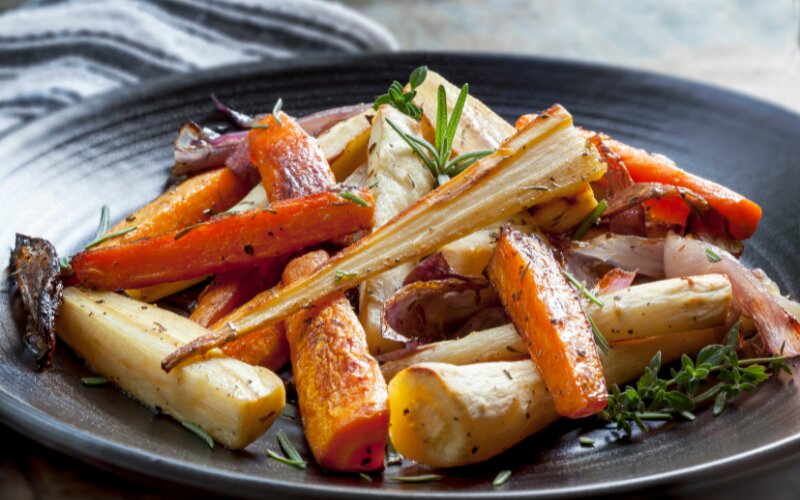
Root Vegetables
Root vegetables are simply edible plant roots. They include vegetables like beets, carrots, jicama, parsnips, rutabaga, and sweet potatoes. Low in calories, full of fiber and rich in key vitamins and minerals, root vegetables are definitely worth including at your next meal. Preparation methods for root vegetables are endless: raw, roasted, steamed or boiled; there are many ways you can incorporate them into meals.
Try:
- Raw: Jicama sliced into sticks with a sprinkle of cayenne pepper and squeeze of fresh lime juice
- Roasted: Carrots and parsnips with a sprinkle of grapeseed oil, Italian seasoning and a dash of black pepper.
- Steamed, Rutabagas and carrots steamed and then mashed.
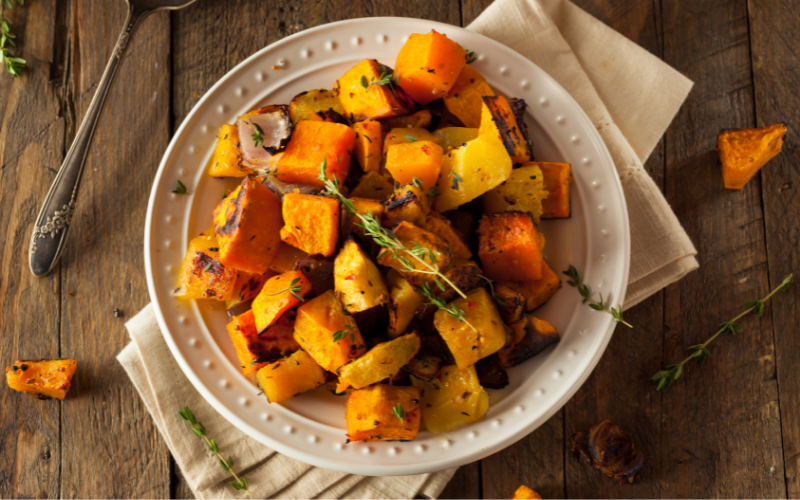
Enjoy produce during the winter by incorporating new choices and preparation methods. Focus on including vegetables with a variety of colors to vary the nutrient profile on your plate. When possible, aim to include seasonal choices to support your local farmers by choosing foods typically harvested toward the end of the season. It won’t be long before spring arrives but in the meantime cherish the bounty that the winter has to offer.
| Winter Vegetable | Nutrition Facts | ||||
| Calories | Fat | Carbohydrates | Fiber | Protein | |
| Beets
(1/2 cup cooked) | 37 | 0 | 8 | 2 | 1 |
| Broccoli
(1/2 cup, raw) | 15 | 0 | 3 | 1 | 1 |
| Brussel Sprouts
(1/2 cup, cooked) | 28 | 0 | 5 | 2 | 2 |
| Cabbage
(1/2 cup, cooked) | 17 | 0 | 4 | 1 | 1 |
| Cauliflower
(1/2 cup, cooked) | 14 | 0 | 3 | 1 | 1 |
| Carrots
(1/2 cup, cooked) | 27 | 0 | 6 | 2 | 0 |
| Chard
(1/2 cup, cooked) | 18 | 0 | 4 | 2 | 2 |
| Kale
(1/2 cup, cooked) | 18 | 0 | 4 | 1 | 1 |
| Parsnip
(1/2 cup, cooked) | 55 | 0 | 13 | 3 | 1 |
| Spinach
(1/2 cup, cooked) | 21 | 0 | 3 | 2 | 3 |
| Rutabagas
(1/2 cup, cooked) | 36 | 0 | 8 | 2 | 1 |
| Turnips
(1/2 cup, cooked) | 29 | 0 | 4 | 2.5 | 2 |
| Yams
(1/2 cup, cooked) | 79 | 0 | 19 | 3 | 1 |
Source: USDA Nutrient Database
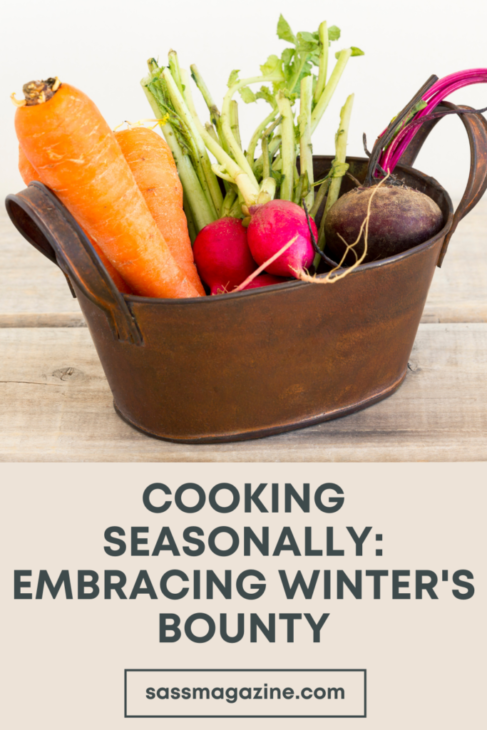

Alison Massey
Alison Massey is a registered dietitian (RD), certified diabetes care and education specialist (CDCES), and freelance writer. She's been working in the field of nutrition for more than 15 years helping individuals make sustainable changes to improve their health. When she's not writing you can find her basking delicious recipes or exploring the Chesapeake Bay in Southern Maryland where she resides.












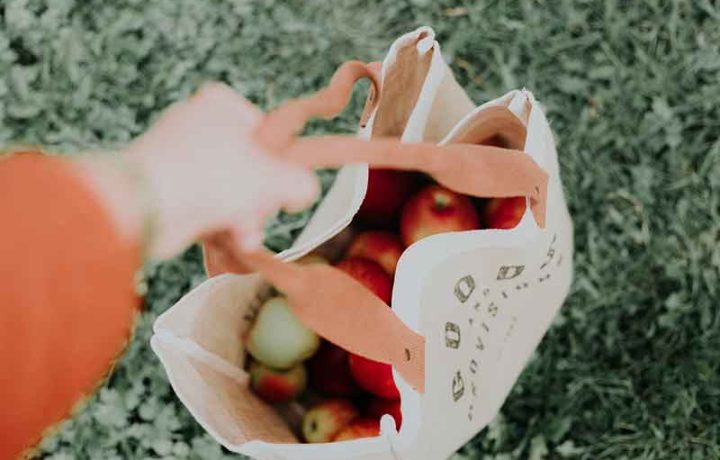












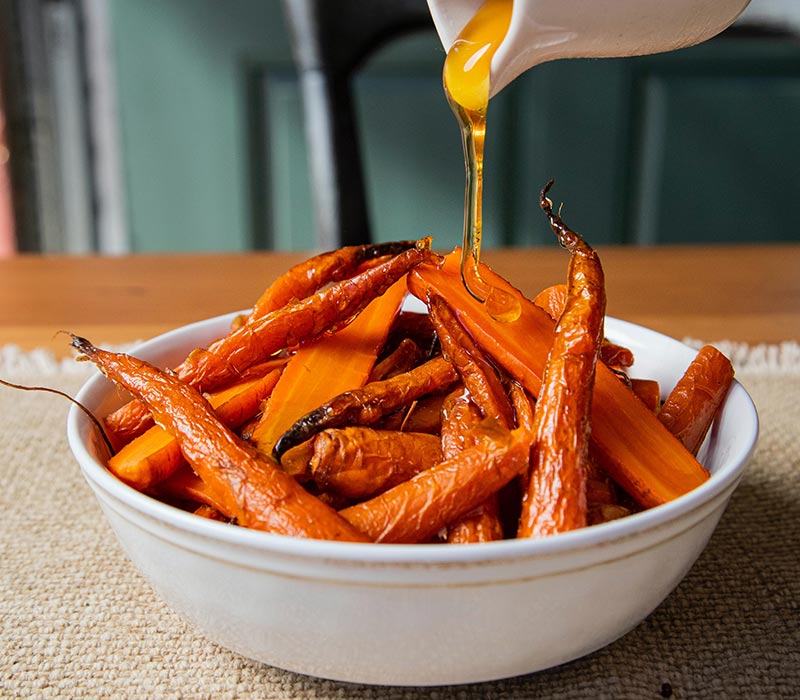
Subscribe so you don’t miss a post
Sign up with your email address to receive news and updates!